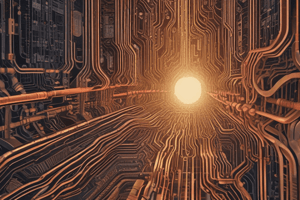Podcast
Questions and Answers
What are the objectives of studying Advanced Computer Architecture?
What are the objectives of studying Advanced Computer Architecture?
The objectives are to understand the advance hardware and software issues of computer architecture, multi-processor architecture & connection mechanism, and memory management.
What are the topics covered in Module-I of the course?
What are the topics covered in Module-I of the course?
The topics covered in Module-I include Microprocessor and Microcontroller, RISC and CISC architectures, Parallelism, Pipelining fundamentals, Arithmetic and Instruction pipelining, Pipeline Hazards, Superscalar Architecture, Super Pipelined Architecture, VLIW Architecture, SPARC and ARM processors.
What does Module-II focus on?
What does Module-II focus on?
Module-II focuses on Basic Multiprocessor Architecture including Flynn’s Classification, UMA, NUMA, Distributed Memory Architecture, and Array Processor, Vector Processors.
What is covered in Module-III of the course?
What is covered in Module-III of the course?
What is the focus of Module IV?
What is the focus of Module IV?
Flashcards are hidden until you start studying
Study Notes
Advanced Computer Architecture Objectives
- Understand advanced hardware and software issues in computer architecture
- Understand multi-processor architecture and connection mechanism
- Understand multi-processor memory management
Microprocessor and Microcontroller Basics
- RISC (Reduced Instruction Set Computing) architectures
- CISC (Complex Instruction Set Computing) architectures
- Parallelism and pipelining fundamentals
- Arithmetic and Instruction pipelining
Pipeline Concepts
- Pipeline Hazards
- Superscalar Architecture
- Super Pipelined Architecture
- VLIW (Very Long Instruction Word) Architecture
- SPARC and ARM processors
Multiprocessor Architecture
- Flynn's Classification
- UMA (Uniform Memory Access) architecture
- NUMA (Non-Uniform Memory Access) architecture
- Distributed Memory Architecture
- Array Processors
- Vector Processors
Interconnection Networks
- Static Networks
- Network Topologies
- Dynamic Networks
- Cloud computing
Memory Technology
- Cache memory
- Cache memory mapping policies
- Cache updating schemes
- Virtual memory
- Page replacement techniques
- I/O subsystems
Outcomes
- Ability to understand advanced hardware and software issues in computer architecture
- Ability to design and implement multi-processor architecture and connection mechanism
- Ability to manage multi-processor memory
Studying That Suits You
Use AI to generate personalized quizzes and flashcards to suit your learning preferences.




